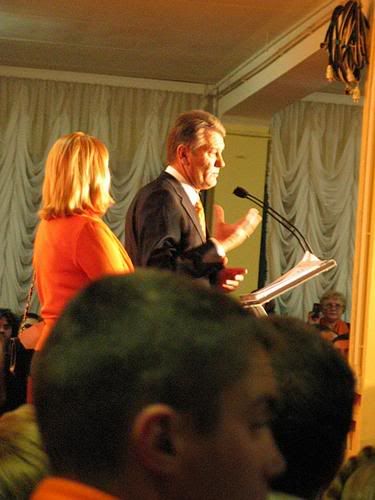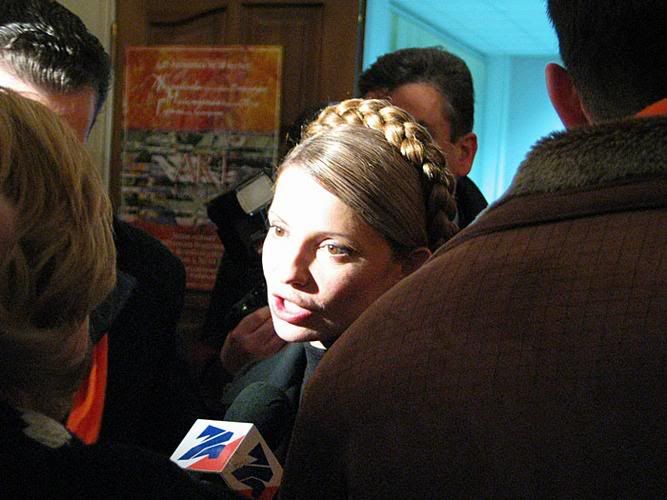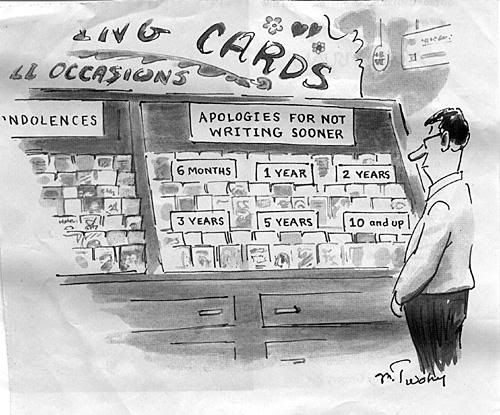Wednesday, December 29, 2004
I can't believe I was in Kyiv just two days ago. Friends are sending us sms with the news - the latest one was about Tymoshenko speaking on the odious Donetsk Ukraina TV station, wearing an orange Shakhtar shirt given to her by Akhmetov. They kept bitching about those poor people who died at the polling station and blamed Tymoshenko for it - because, according to them, it's her fault that the election amendment got passed - and she replied that Yushchenko and herself, as well as her bloc, did not vote for the amendment, while Yanukovych's bloc, pro-Kuchma majority and the Communists did. The loud crowd outside the studio were calling Tymoshenko "Yushchenko's whore" - and it was audible in the studio.
Apart from the sms, I am trying to follow what's going on through Abdymak, Discoshaman, TulipGirl and Orange Ukraine - thanks! Still, it's totally weird not to be in Kyiv. Funny to be in the same situation that many of my friends and those have have left comments here are in - to see it all through someone else's eyes... In the local English-language paper today, there was just a little picture of that ancient-looking woman (who's just 66 in reality), wrapped in the Ukrainian flag and cheering for Yushchenko. The picture was on page one, at least.
But I needed this vacation. Last time I was reminded of it was on Sunday, when I was scammed out of 200 hryvnias (approximately $40): I was sitting in the Dnipro Hotel lobby, waiting for the colleague I was assisting that day, and a man sat next to me, said Good morning, told me he was from Bangladesh, on business in Ukraine, named Sadek, with a wife at home and no way to get there because he was dragged out of a taxi on his way to the airport, beaten and robbed. He said he had no passport and no money to buy an international phone card, and that he had gone to the post office and tried to exchange his ring for a phone card but the woman there was a bitch and didn't take it, and now he was sitting here waiting for some foreigners to show up, totally embarassed about having to beg them for money. He didn't tell it all so fast - there was lots of small talk, about hot weather in Bangladesh, about their 1970 election, about him being a Muslim, etc. He was nice even though his accent in English was kind of crazy - and I was in a wonderful mood, having just voted. Man, I loved the whole world then - this time Yushchenko is definitely going to win, and my vote will help him to! So I ended up giving the Bengali guy 200 hryvnias, which is a lot - it takes many people a month to earn this amount. He took my phone number and gave me his, and said he'd come back to the hotel (he stayed at Dnipro, he said) to return the money. After he left, I heard this song on the radio in the lobby - don't know who sings it but it goes like this - What if God was one of us... [...] ... Trying to make His way home... How fitting, I thought.
Normally, I'm not that dumb, really. But I slept too little that night, and I was so afraid to be late for my appointment that I came 20 minutes early, and as I've already said, I was blinded by happiness. Of course, he didn't show up in the evening. I spoke to people at the reception - they didn't have visitors from Bangladesh. I warned them about the guy, just in case. In case there are idiots like me out there. And then I realized once again that I need a vacation badly.
So here I am in Istanbul, totally loving it. One of the best cities in the world.
I'll post pictures as soon as the fotopages are back. (Just noticed that my blog looks all screwed up on this computer - first, there are the links, and to get to the actual text, I have to scroll down all the way past the link... - but who cares, I'm not gonna try to fix anything right now...)
Hope it'll all end wonderfully in Kyiv.
Love to all,
Veronica
Tuesday, December 28, 2004
Monday, December 27, 2004
Sunday, December 26, 2004
And my pictures are here...
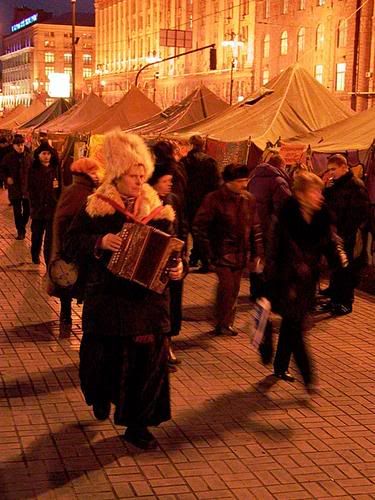
Some stats:
- 37.61 million voters
- 38.3 million ballots
- 188,070 absentee ballots (down from 4% to 0.5% of the voters; for the Nov. 21 runoff there were 1.5 million absentee votes)
- 32,118 polling stations (there were two more last time - in the maternity wards, which have since been closed)
- 12,184 observers
I'm finally done posting all those Dec. 22 pictures that I took with the Panasonic but then couldn't download. It took me so long because either my internet connection isn't okay, or fotopages.com aren't, or both. The pictures aren't the best quality, and I also tried to write some captions but then gave up - please forgive me for that. Oh, and I also have about 70 pictures from yesterday - and I really hope to have a few hours to post them sometime tonight...
I gotta run now...
Wish us good luck, please...
Saturday, December 25, 2004
It was a New Year's celebration, both for adults and for kids, nothing too special, some folk singing and dancing, real loud, then the fireworks, lots of kids with their parents, everyone happy. Even though it's supposed to have nothing to do with Yushchenko, it still feels like one of those big rallies - a happy, friendly crowd.
I passed Yanukovych headquarters maybe half an hour before I got to Maidan, and there was a Christmas tree there, too, and a stage with a screen, big for that area but small compared to the one at Maidan, but there were very few people there and it didn't feel like a celebration at all. The guy who was giving me a ride said his company remodelled the movie theater building for Yanukovych people - and they still owed them some money, even though they promised to pay "mountains of gold." He had a ribbon on his car's outside antenna and a Yushchenko sticker inside, and he was sure of Yushchenko's victory.
I've been running all day and still have to run now, and will probably be running from relatively early morning tomorrow.
More later tonight, hopefully.
I've already posted the first three pictures, the ones I took right before the camera broke - the huskies dressed in orange on Khreshchatyk (either Nov. 28 or 29 or 30, I don't remember)!
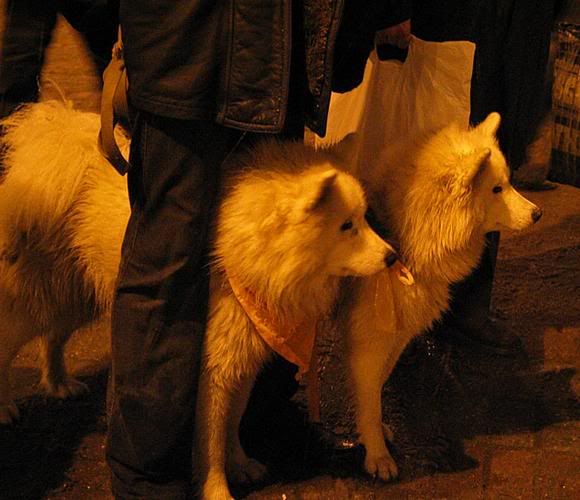
More later...
Friday, December 24, 2004
The guy's not worried about the tournament's name, though he did mention that his wife was no longer as eager to wear an orange scarf as she had been before: there are more people in the region now who are openly hostile to Yushchenko's supporters.
The stupidest question of the day, possibly year
On the New Channel last night in an interview with Yuschenko, the host of the program said this (paraphrase):
"Host: You were late for our interview here, does that mean that you will be late for reform?"
Yuschenko: (Me: "He has to be thinking that is the stupidest question ever.") "We were in some heavy traffic coming here. It was something that was out of my hands."
The New Channel was a supporter of Yanukovych before the revolution. Old habits die hard it seems.
Idiotically, my favorite part of the show was the last name of one Luhansk man: Gnilorybov - Rotten Fish.
I have a terrible bias to confess: I hate Luhansk. I've been there once, on a work trip, and it was a total disaster. It was one of my last trips at that NGO job, at the end of 2000, and by that time I had visited all but two of the 25 Ukrainian regions. Each one was paradise compared to Luhansk.
In Luhansk, we had to find a connection in the regional government (through the American Chamber of Commerce), to buy our train tickets back to Kyiv - such a 1980s kind of idiocy, we call it blat (not to be confused with blyad', which is a curse word). In Luhansk, people working in small and medium businesses kept telling us that the infamous neighboring region of Donetsk was an idyllic place compared to Luhansk, because it had a relatively low level of corruption.
It was awful and I hate to remember that one week we spent there, but I do have some notes from the trip in St. Pete, so maybe one day I'll post some of it here or elsewhere. I'm not going back there, ever - so I'll have to rely on the stuff I have as well as the memories of my colleagues when I decide to write about Luhansk.
I do not think it's a coincidence that Luhansk prefers Yanukovych to Yushchenko. In one of the previous elections, they all voted for Natalya Vitrenko, head of the Progressive Socialist Party, who promised to shut down all international airports when she came to power, to protect us from America and other such evils.
Anyway, I am totally biased against the gloomy city of Luhansk and, by extension, against the whole Luhansk region. Call it unjournalistic but at least I'm honest.
Lviv, on the other hand, is my favorite place in Ukraine, even though it's a bit too polluted in summer and they always have problems with water (one of my dear Lviv friends used to live in New York for several years, and even when she had time to sleep in, she'd still jump up before 7 am and run to the shower, before the water is shut off for the rest of the day - which, of course, never happened because it was New York, not her native Lviv).
I can write about Lviv forever, and then about Uzhgorod, and the Carpathian Mountains, and then about Odesa, a city I also adore, even though they vote for Yanukovych, and then about Crimea... but it's 3:45 am now, so I better stop.
A non-sequitur conclusion to this post is this: I wish we Ukrainians could be as efficient as the Turks in making the beautiful parts of our country - the ones I've just named - more comfortable for tourists. That would help the economy or, at least, we'd be able to take that imaginary load of feeding the whole country off the shoulders of Luhansk and Donetsk.
There has been so much violence in Iraq that it's become hard to distinguish one senseless act from another. But there was a picture that ran on the front page of this newspaper on Monday that really got to me. It showed several Iraqi gunmen, in broad daylight and without masks, murdering two Iraqi election workers. The murder scene was a busy street in the heart of Baghdad. The two election workers had been dragged from their car into the middle of the street. They looked young, the sort of young people you'd see doing election canvassing in America or Ukraine or El Salvador.
One was kneeling with his arms behind his back, waiting to be shot in the head. Another was lying on his side. The gunman had either just pumped a bullet into him or was about to. I first saw the picture on the Internet, and I did something I've never done before - I blew it up so it covered my whole screen. I wanted to look at it more closely. You don't often get to see the face of pure evil.
This mention of Ukraine is depressing, and the photo is even more so. It's true that "you don't often get to see the face of pure evil" - but some places offer more chances than others.
Kyiv, hopefully, isn't on the verge of becoming a place like Baghdad.
We, after all, are experiencing an influx of international election observers (I don't remember the numbers but is it something like 7,000 people?), while the Jan. 30 election in Iraq will most likely be observed - or assessed - from a safer place, Jordan:
Representatives of seven nations met in Ottawa this week to recruit international observers for the Iraqi elections and agreed to watch the vote, but from the safety of Amman, Jordan.They said it was too dangerous to monitor the voting in Iraq, meaning international observers are unlikely for the elections on Jan. 30 - making them the first significant vote of this sort recently with no foreign presence, United Nations officials say.
Thursday, December 23, 2004
...na sionistskih (ogovorka - antisemitskih) lozungah...
My other friend - a radio friend - responded with a news story he'd read recently, about an orphanage director in Odesa (or Odesa region) who refused to accept a donation made up of oranges; his objection sounded something like this: "Why have you brought us oranges that are so orange?" Goddamn Soviets. (I wish I had a link to this story.)
I returned to Maidan around 7 pm and the square looked and sounded exactly the way it did two weeks ago and before that: filled with people (around 80,000), various flags in the area next to the stage (Ukrainian national, orange, banned Belarusian, new Georgian, Polish), lots of light, lots of music, bursts of Yushchenko! Yushchenko! chant.
What made yesterday's Maidan different from its predecessor was a huge Christmas tree in the middle of the square. When I was there in the early afternoon yesterday, they were still decorating it, using a high-rise construction truck - but they were done when the people gathered for the rally. The tree was dark, though - I wonder if they're gonna light it up at some point.
I got too cold standing outside and listening to Yushchenko speak, so we ended up at the bar again. The place used to be totally filled up at the peak of the revolution, with no room to stand on some days. Then they got about two weeks of relative rest, up until yesterday. This bar is located deep in one of the backyards just off Khreshchatyk - it's difficult to find it the first time and nearly impossible to stumble upon it; it is also tiny so you get to know the regulars, their faces if not names. But last night, it was full of people I'd never seen before, speaking English, and what a friend told me was the Québec French, and maybe something else, too, and we figured they must have all come to Kyiv to observe the election.
It makes Kyiv look like the summer St. Pete - foreigners everywhere. Only here these people aren't tourists but have come to help. Nice. (I actually love St. Pete's touristy crowds - without them, the city is less alive.)
When we got outside, I realized I was so happy Maidan was back - all the commotion, all the people, happy and friendly, oblivious to the cold, all the noise, and the music - all of it is back! My friend said this was one of the things Yulia Tymoshenko spoke about yesterday, too - You must've all missed Maidan, didn't really know where to go to after work these past two weeks, etc. I myself have moments when I wish I could spend the New Year's at Maidan, not in Istanbul - but I always end up longing for Istanbul again and hoping that they're not gonna declare emergency state after the election, thus spoiling the holiday for everyone...
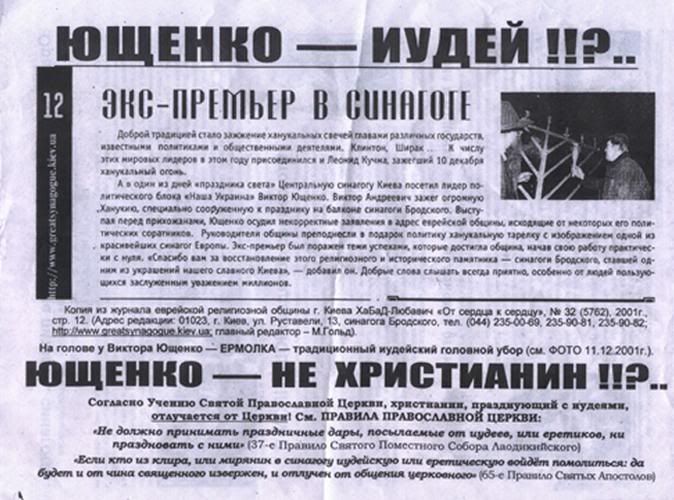
Here's partial translation:
YUSHCHENKO - A JEW !!?..
[The picture on the right-hand side is of Yushchenko lighting a Hanukkah candle on the balcony of the Kyiv synagogue three years ago, Dec. 11, 2001. The text next to the picture is an excerpt from a local Lubavitcher magazine, about Yushchenko's visit to the synangogue.]
------------
[The magazine's name - From Heart to Heart, address, phone numbers, URL and the editors last name.]
On Victor Yushchenko's head - a YERMOLKA [yarmulke] - a traditional Jewish skullcap (see Dec. 11, 2001, PHOTO).
YUSHCHENKO - NOT CHRISTIAN !!?..
According to the teachings of the Holy Orthodox Church, a Christian celebrating with the Jews has to be excommunicated from the Church! See THE RULES OF THE ORTHODOX CHURCH:
"One shouldn't accept holiday gifts sent by the Jews or the heretics, nor should one celebrate with them." (the 37th Rule of the Holy Council of Laodicia)
"If someone from the clergy, or a layman, enters a Jewish synangogue or a temple of the heretics in order to pray, he should be stripped of his holy title and excommunicated from the chuch." (the 65th Rule of the Holy Apostles)
On the reverse side, there's a mini newsletter, sort of (I'll post it when fotopages start working properly again).
Here're the headlines:
Orange Revolution in Kyiv is fed ... by the synagogue!.. (a photo of Kyiv's mayor Oleksandr Omelchenko at the Kyiv synagogue)
Who Currently Possesses Yushchenko?.. (a photo of Yushchenko with his American-born wife, Kateryna Chumachenko)
Kuchma and Yushchenko Light Jewish Candles(a photo of Kuchma lighting a menorah candle)
Our next-door neighbors are an elderly Jewish couple voting for Yanukovych. I'm sure they got this leaflet, too, and, who knows, maybe they'll change their minds and end up voting for Yushchenko, now that he's no longer a fascist but a Jew.
***
Ironically, Putin said this (in Russian) about Ukraine at a news conference earlier today:
The only thing we're counting on is that Yushchenko isn't surrounded by people who are relying on anti-Russian, Zionist slogans in their activity.
He could've meant anti-Semitic, not Zionist - though who the fuck knows.
Wednesday, December 22, 2004
I walked inside the Khreshchatyk tent city today, getting used to my new camera (still can't download anything from it but am no longer so upset about it). Everyone's friendly, eager to be photographed, energetic and cheerful; the small tents look deserted and the big tents are warm (one of the boys invited me into a cafeteria tent); there's also an open-air place where you can have decaf coffee and snacks, and an open-air kitchen (the girls there were preparing dinner when I walked by - they were peeling orange carrots and started posing for a picture as soon as I paused!..). I even saw a relatively big dog near one of the tents - it was wrapped in blankets and asleep by a tent of its own, a doghouse...
Around 4 pm, I saw a group of 20-30 guys lined up by one of the big tents - their leader was telling them when and in what order they were supposed to go wash themselves (I wonder where... should ask tomorrow), and other disciplinary stuff; at some point he said something I didn't hear and then added, And if someone misbehaves, he'll be sent straight back to Kharkiv. He sounded like he meant it. I looked at one of the big tents nearby - and noticed the word "Kharkiv" written on it. This is how well-organized everything is.
Actually, for an outsider, the tent city feels like both like a tourist camp and a boot camp, fun mixed with order.
I'm running to Maidan now, probably too late to hear Yushchenko speak live...
Mishah has finally come here for a vacation, but as soon as he arrived, he went down with a severe cold.
He's brought me another camera, a Panasonic DMC-LC5, but I can't figure out how to download pictures from it to my PC - I doubt I have the right software. I never know how stuff works. All I know is how to break everything. You know how people always want their children to be what they themselves are not? If I ever have a child, I hope he/she is not gonna be as dumb with all the equipment as I am. I'm hopeless.
PORA is dismantling the tents by the presidential administration tomorrow, at noon. I wanted to go there and take pictures. Now I'm not as eager. The Khreshchatyk tents are now really picturesque, too, after a bunch of local painters spent some time playing there - and I wanted to photograph that as well. Finally, there's gonna be a rally at Maidan at 5 pm - it'd be too dark for the pictures then, but right now such a reasonable observation isn't making me feel better.
Perhaps I should stop whining. I can always stop by at an internet cafe and ask them to download the pictures on a CD-R for me. Yes, this is what I'm probably gonna do tomorrow. Or maybe I'll figure out how to deal with it at home.
I hope Mishah gets well soon.
Tuesday, December 21, 2004
The real reason why I myself have very sketchy notes is because I was watching the debate at a bar yesterday, with a former high school classmate who now lives in Berlin and is visiting for the holidays with her 3-year-old son. We haven't seen each other in more than a year and were chatting most of the time, and I was sort of watching the reactions of the crowd in order not to miss something truly outstanding.
My friend asked me halfway through the debate: "And who are those two men on the screen?" and I was like, "Are you serious?"
She did know the names, though - just didn't recognize the faces, especially since we were sitting pretty far from the small screen, and my friend's glasses weren't strong enough. She still has her Ukrainian citizenship and may try to find a way to vote Dec. 26. Her parents here in Kyiv support Yushchenko and she had an orange ribbon on her bag.
I'm writing about this mainly because I've just run into a New York Times piece about the "Russians" living in Berlin...
Berlin is a mysterious city, [Wladimir Kaminer] writes in "Disguised Businesses," one of the short stories in "Russendisko.""Nothing here is real, everybody is himself and at the same time somebody else," he writes. "The Chinese vendors at the fast-food stand across from my building are Vietnamese. The Indian restaurant on Rykestrasse is run by a full-blooded Tunisian from Carthage. And the boss of the African-American bar with all that voodoo stuff up on the walls is Belgian."
"Coming from Moscow, you have to understand that Berlin is heaven," Mr. Kaminer said in an interview, explaining the absence of sarcasm or bitterness in his various sketches. "I love Berlin. Here you can be yourself, do what you want, and even if you are completely crazy, nobody will care."
Here's a link to the translation of Kaminer's book at amazon.co.uk: Russian Disco.
National security service guys are hurt:
With a plot that would make Christie proud, much of Ukraine's leadership finds itself in the role of suspect, including General Smeshko, the S.B.U. chairman, who met with a Western reporter for what he described as the first time in a 32-year career.
"The main message is this: Our security service did not do Mr. Yushchenko any harm, and did not try to do him any harm," he said. "This we know for sure. All other versions we will check."
When asked how he reacted to being mentioned publicly as a suspect, General Smeshko, who has two young sons, answered with a question. "How would you like it if your kids asked you, 'Did you do it, Dad?'" he said, locking eyes with a reporter for several long moments.
He added: "It is really painful. We will do everything to know the truth. Basically, this is a case for the dignity of our whole service."
And furious:
Still, public attention remains focused on the late-night meal, frustrating investigators who say a larger window of time needs to be examined, and infuriating Mr. Satsyuk, the host, who challenged the opposition leader to accuse him to his face.
"I am ready to meet live on the air with Mr. Yushchenko," he said. "I would like him, looking into my eyes, to say that he was poisoned at my dacha. I can do this at any press conference at any time.
The Russians remain proud:
Russia's special services scoff at suggestions of their involvement. "I consider it below my dignity to comment on," said Boris N. Labusov, the senior spokesman of the S.V.R., Russia's foreign intelligence service.
Kuchma's family offers great insight - but says nothing about the headless body of Georgiy Gongadze:
Mr. Kuchma's family, which also has said it was not involved, said the dacha theory was foolish. Any government wanting to kill an opponent, the family's line of thinking goes, would not try it at a meeting with government officials. "I think they are not kamikazes," said Viktor M. Pinchuk, Mr. Kuchma's son-in-law and a member of Parliament.
A New York Times caption writer must have been watching too much Peter Greenaway lately - that's way cooler than Agatha Christie, if you ask me:
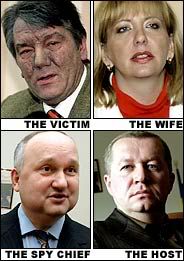 | 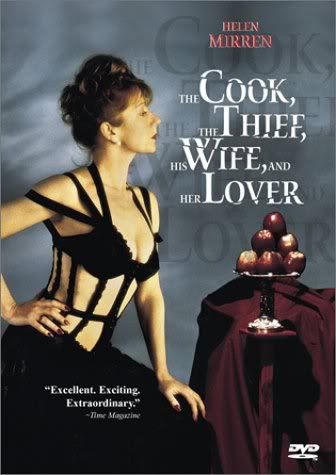 |
But he/she got most of those Ukrainian names wrong:
The Victim - Viktor A. Yuschenko [sic] nearly died, but is not helping the authorities. The Wife - Kateryna Chemechenko [sic] tasted something medicinal on her lips. The Spy Chief - Gen. Ipor [sic] P. Smeshko ate crayfish and drank beer with the victim. The Host - Vladimir Satsyuk provided the dacha for a midnight meal.
Mr. Chivers (or is it Shivers?) encountered a similar problem: according to David Zhvaniya, Yushchenko's campaign aide, Yushchenko's wife is one of those "normal" Americans who react unreasonably when they hear about KGB - but her last name is too weird for an American... either Chumechenko, or Chemechenko... only God knows how to spell it correctly...
Mr. Zhvaniya also dismissed statements by Mr. Yushchenko's wife, Kateryna Chumechenko [sic], who is an American citizen, that she tasted something medicinal on his lips after he returned from the dacha. "She is a normal woman, and to her with the words K.G.B. and S.B.U. comes an unreasonable reaction, the more so because she was brought up in the United States," he said. (Toxicologists say dioxins are tasteless, although Dr. Schecter pointed out the provenance of this assertion is uncertain; he knew of no one who had ever tried tasting them.)
(The right answer is Chumachenko.)
I watched much of it but not too carefully, and I definitely wasn't one of those who held their breath, uncertain as to who's gonna win. I am also not one of those who believes the debates are gonna change anyone's position. I expected Yanukovych to say something totally stupid but heard only a few minor things that were kind of funny. I also expected Yanukovych to have a stroke at the end of the debate, when his head started to shake quite noticeably and seemingly uncontrollably, but that didn't happen either, as far as I know. Yushchenko was a lot more assertive than the first time - but his arguments were as good as they were then.
Monday, December 20, 2004
In Russian, I found her recent, very short interview with the press secretary of the Security Service of Ukraine (SBU), about the fateful Sept. 5 dinner that Yushchenko had with SBU's head and his deputy, a tiny piece on Yanukovych's wife, and a bunch of stories that have nothing to do with politics. In English, there's a translation of her story on "children born by children" - on the Pravda site...
The book is called Dear Comrade Editor: Readers' Letters to the Soviet Press Under Perestroika (translated and edited by Jim Riordan and Sue Bridger). I opened a chapter on Nationalism and here's what I found about Ukraine:
Ten Political Parties to Choose from in the Ukraine
Sobesednik, #30, July 1990
Let me tell you a fact: I don't know anyone who does not belong to a party. Each of them now has the choice of at least ten parties:
So it's not boring. Some parties are now going through a period when all they can do is meet - owing to the lack of photocopiers, which sometimes have to be brought in sacks from neighboring republics. The rank-and-file of the ruling party, the CPSU, are feeling the pinch, especially when people suggest they answer for the situation that has developed in the Republic, or why there is a crisis of power in the Ukrainian Supreme Soviet where 80 percent of the deputies are Party members.
- Ukrainian Republican Party
- Social Democratic Party of the Ukraine
- Ukrainian National Democratic Party
- Peasant Democratic Party
- Democratic Platform within the Ukrainian Communist Party
- Confederation of Anarcho-Syndicalists
- Ukrainian Communist Party
- The Greens
- Liberal Democrats
- Left Socialists of the Ukraine
For the authorities, 11 July 1990 was a fateful day. First there was the surprise when the Supreme Soviet Chair had to resign. Then there was the miners' strike in Donetsk and spontaneous protest meetings and strikes at the Ukraine's largest enterprises. This led to the people besieging the Supreme Soviet, chanting "Down with the Communist Party!" The session was saved by the behavior of the opposition - the National Rada - which managed to calm the chanting crowds.
Then suddenly a funeral procession with wreaths walked around the parliament building, bidding a permanent farewell to the Chair (Comrade Ivashko). They even appealed to the reorganized Ministry for Water to change the flow of the Dnepr so as to make the wreaths flow up the river to Moscow.
For the second time the session had to choose a Chair, but two events forced the vote to be postponed: the adoption of a Declaration on the state sovereignty of the Ukraine and the voluntary retirement of the first Chair. Chairpersons come and go, but the homeland remains.
Olga Musafirova
Kiev
It's so amusing and so sad to read this now, 14 years later. It definitely wasn't boring then and it's not boring now; our political sense of humor is still very much there; the miners of Donetsk still live in shit; and, in addition to the Communist Party, we are now trying to get rid of Kuchma and his guys. Yes, and the homeland remains, thank God.
A few pages later, there a bit from Vadim K., from Khmelnitsky, West Ukraine:
I hate socialism in the form it's presented to us. I'd go to any lengths to get rid of that socialism.
Oleksandr Moroz, today's Socialist Party leader, is our ally this time. I have a very vague idea about the kind of socialism he stands for - actually, I've no idea. All I know is that he's a very smart politician, very calculating. I doubt his kind of socialism is what they have in Sweden: I wouldn't want to pay huge taxes in this country if he came to power - because I know that this money would end up in somebody else's pocket, or a Swiss bank account, and wouldn't go towards creating a "safety net" or whatever you call it.
I probably sound like such a Soviet now, with all my negativism and stuff. But I can't help it, not right now. Maybe I'll feel more optimistic tomorrow.
I can't wait for our Istanbul vacation.
I'm not really trying to argue with a political expert, but my own impression is that Yushchenko has been overly eager to negotiate, even when many of the Yanukovych supporters were advocating secession. Now it seems like some of them are advocating violence - they'd rather see their country in a Yugoslavia-like mess than lose their assets - so is there really any use having a dialogue with them? What if they manage to negotiate themselves back into power, even if Yushchenko is the legitimate winner? Haven't we had enough of kleptocracy? And what's the point of wasting all that money on election then?
I think the only way to avoid bloodshed is to have people realize that none of these politicians are worth our lives - not even Yushchenko or Tymoshenko, and definitely not Yanukovych. I really hope most Ukrainians understand it.
Sunday, December 19, 2004
He switched into Russian so that President Putin and the commander of the Russian forces based in Sevastopol understood him without translation tomorrow, when they receive the footage of his address.
Omelchenko alleges that weapons belonging to the Russian Black Sea Navy based in Sevastopol have been transferred to Donetsk in order to arm groups of men who would arrive in Kyiv Dec. 27 or 28 to incite violence.
Kuchma would then declare state of emergency, the election results would be cancelled and the new election would be postponed for as long as half a year, allowing Kuchma to stay in power until the recently adopted constitutional amendment comes into force.
Omelchenko has named the types of weapons available to the men in Donetsk but I, unfortunately, am not a weapons expert.
According to him, 30 groups have already been formed, each consisting of 30 men recently released from prisons as well as professionals in martial arts; each group is headed by a special forces fighter.
Everyone knows about the operation that is being planned - Putin, Kuchma, the Russian Navy guy, the Ukrainian Ministry of Internal Affairs people, etc. Yanukovych is sort of reluctant to proceed with the plan, but Akhmetov and Klyuyev, the guys who support Yanukovych financially and on whose money the weapons have been acquired, are forcing him to.
Omelchenko has asked Putin to order his men to stop selling weapons to Donetsk and to have the weapons already in Donetsk returned to Sevastopol, in order to avoid bloodshed.
Dear Ukrainians, please don't make it hard for us to tell your story.
I spell Kyiv as 'Kyiv' primarily because I'm used to it, after two years of working for a U.S. State Department-funded program here in Ukraine. My hand is used to typing it this way. In real, non-English and non-writing, life, the way in which I pronounce my native city's name depends on whether I'm speaking Russian or Ukrainian at the moment.
I do not care which language the Christian Science Monitor folks are transliterating from, Russian or Ukrainian. The latter, of course, feels like a more natural choice - but I understand that for many English-speaking people it's impossible to imagine what 'Kyiv' actually sounds like, because of this "so-called 'middle vowel' that simply doesn't exist in English." I myself have no idea how to pronounce most French words and names and wish they were all spelled in a more Anglicized way - so I can't really blame anyone who finds it easier to transliterate from Russian, not Ukrainian: it's not like they are trying to erase Ukraine from the map, after all.
And if I were a Diaspora Ukrainian, I wouldn't be wasting my time writing letters to the editor, complaining about something as minor as the spelling of the name of their old country's capital. There're bigger issues, and one of them is that Ukraine was more or less missing from the news until about a month ago: Kyiv or Kiev, we were an obscure little place no one gave a shit about, until all those orange crowds decided to rally peacefully in the freezing cold. And the fact that we were not considered newsworthy enough cannot be explained away by our unwillingness to make it easier for American editors to tell our story.
I wouldn't blame those editors too much, though, because, if you ask me, Pakistan isn't covered enough in Ukrainian or Russian media, either - not as much as I would have wanted it to and not as much as it deserves - and in general, Israel and Palestine get incomparably more attention in the world media than Pakistan, Kashmir and India, which is totally inexplicable and unjustifiable.
So Ukraine isn't the only country whose story is being ignored much of the time - but what's cool is that we don't cease to exist when we disappear from the news, and we're still there even when no one knows anything about us.
There are two obvious differences between bloggers and the traditional press: unlike bloggers, professional journalists have a) editors and b) the need to maintain a professional reputation so that sources will continue to talk to them. I've been a journalist for more than a decade, and on two occasions I asked acquaintances whether I could print information that they had told me in social situations. Both times, they made clear that if I published they would never speak to me again. Without a reputation for trustworthiness, neither friendship nor journalism can be sustained over time.
I don't mind working with editors - many of them are totally cool guys. But I also love being the editor of my own. As an editor, I'm being kind to myself most of the time: I allow myself not to explain those really obvious things about Ukraine or Russia (I sort of assume everyone knows what Chernobyl is and what Dostoyevsky's Crime and Punishment is about); and I also free myself from having to justify every little thing I bother to write about (Why should this or that be interesting to your American/European/non-Ukrainian/non-Russian audiences, Veronica? - I may know the answer to this question or I may not, but it doesn't really matter, as long as what I write about is interesting to me). It wouldn't hurt, of course, if I could somehow pay myself for being such a sweet editor, but oh well, there are other ways of making money, and "traditional" journalism is just one of them.
Here's one of the latest AP stories from Baghdad, on the pre-election violence:
BAGHDAD, Iraq - In a brazen attack in downtown Baghdad, nearly 30 gunmen ambushed a car carrying employees of the Iraqi organization running next month's elections, killing three of the workers, an election official said.
Adel al-Lami, a member of the Independent Electoral Commission of Iraq, said the early morning attack happened in downtown Baghdad's Haifa Street, the scene of repeated clashes between security forces and insurgents.
Al-Lami said about 30 militants attacked a car carrying five employees working for the commission's Baghdad office, hurling hand grenades and firing with machine guns.
Three employees, including a security guard, were killed while two escaped unhurt.
The militants "tried to drag them out of the car," he said.
Witnesses said the attackers later set fire to the vehicle and wandered the street openly brandishing their weapons.
I can't imagine something even remotely close to this happening here in Kyiv... And I can't imagine being able to live through a single day of this...
Everyone was talking about curfew before the first round on Oct. 31 - everyone. There was lots of fear in the air. Thank God, nothing horrible happened. It's really easy to dismiss this kind of fear/concern now - we've been there already, the police are with the people, the army is with the people, etc. - but it is wiser to realize that anything can happen yet, because if Yushchenko wins, some people are losing way too much to let it go peacefully.
My friend who had bought a huge flashlight Oct. 30, told me a few weeks ago that it'd be reasonable to stockpile food and drinking water, just in case. I know he's probably right, but neither my parents, nor I are too practical, so I guess we'll just sort of go on being optimistic: we'll vote, then Mishah and I will go to Istanbul, and we'll be sitting there, happy but at the same time jealous of all those who stayed in Kyiv to celebrate the New Year's and the victory at Maidan... I really hope this is how it's gonna be. Maybe I'm just stupid.
A story in the Financial Times on how Kuchma's son-in-law was trying "to find the truth" about Yushchenko's sudden illness, with the help of a "team of public relations experts from EuroRSCG, part of the Paris-based Havas Group"...
Soon after Mr Yushchenko first claimed he had been poisoned, in a speech to parliament on September 21, Mr Kuchma's businessman son-in-law, Viktor Pinchuk, travelled to Vienna and discussed the claims with doctors at the Rudolfinerhaus clinic. He and his wife - Mr Kuchma's daughter, Elena Franchuk - had established contacts with Vienna's tight-knit medical community when their daughter was born in a different Vienna hospital in June 2003.
A team of public relations experts from EuroRSCG, part of the Paris-based Havas Group, also came to Vienna, headed by Yffic Nouvellon, who had worked with Mr Pinchuk and Ms Franchuk in Kiev.
Mr Nouvellon's team arranged a press conference where Lothar Wicke, the Rudolfinerhaus's general manager, contradicted Mr Yushchenko's poisoning allegations. Mr Nouvellon also contacted international media, including the Financial Times, offering evidence that Mr Yushchenko had not been poisoned.
Mr Nouvellon did not reveal his connection to Mr Pinchuk, and when confronted about it insisted he did not know Mr Pinchuk and that he had never been to Kiev. Michael Zimpfer, the Rudolfinerhaus's president, said he had cut the clinic's contact with Mr Nouvellon's team after Mr Yushchenko had informed him of EuroRSCG's ties to the Kuchma family.
"It was a big mistake to involve a company that was clearly biased to one side," Dr Zimpfer said.
Mr Pinchuk said he and his media businesses, which carried reports casting doubt on the poisoning allegations, "had only one goal, to find the truth. All our investigations at that time showed no trace of poisoning."
Some of those allegedly featured in the recordings deny their involvement in the conversations, but the majority refuse to provide official commentary. One source acknowledged the authenticity of the recordings, in a private conversation with Zerkalo Nedeli, but at the same time pointed out that the court would never be able to use such materials as evidence, since they were acquired in violation of the law. Hawever, according to Zerkalo Nedeli's information, eavesdropping on the Yanukovych campaign headquarters could have been organized by a group of the operational-technical department of the Security Service of Ukraine. Thus, an SBU officer might testify as a witness during the trial and prove the lawful nature of collecting these data, as well as their authenticity.
The article about it will be available in English Monday - follow this link and then click on the tiny ENG icon in the upper left corner.
Saturday, December 18, 2004
Here's my favorite part, at the very end:
And on a recent Saturday, she led a service for deaf children, letting each child grasp the traditional shofar, or ram's horn, as she blew. "They hear the shofar by touching it with their hands," she said. "Isn't that amazing?"
And this:
To an extent that surprises even her, she is a trailblazer. "My replacement rabbi for Belarus went back to one of the kindergartens where I worked and introduced himself as the new rabbi," she recalled. "The children who'd grown up with me replied, 'But you can't be. All rabbis are women!'"
And this:
At a bar mitzvah in a village in Belarus, one elderly Jew told her he had not been to such a celebration since 1916, the year before the revolution.
The documentary is based on the recordings of phone conversations between Yanukovych's campaign people, representatives of the Ukrainian Orthodox Church (Moscow Patriarchy), Kuchma's administration and Central Election Commission representatives, and other such individuals, right before and on the day of the Nov. 21 runoff.
The counterfeit ballots are referred to as pechenye, cookies, by these people.
I first saw part of the transcripts at Abdymok, but they are also posted at Obozrevatel and archived by Channel 5. They are in Ukrainian and Russian (as well as, occasionally, in something in between) - and I hope someone gets a grant or something soon to translate it all into English.
In her latest one (in Russian), she writes about the new/old Prosecutor General Pyskun, his bullshit pretenses and the likeliness of the emergence of many others like him in the nearest future: people who'd do everything to appear as if they'd always been on our side (Yevhen Marchuk is one such guy, and Korobova writes beautifully about him, too). She also writes about a possible new Russian scenario - to get rid of Yanukovych, somehow, in order not to let the Dec. 26 revote take place - it's now official that they tried to get rid of Yushchenko, after all, so why anything stop them? There's much more - very funny stuff mixed with some totally serious analysis.
Korobova's pieces are sort of untranslatable, unfortunately - that would require not just the skill but lots of explaining as well, and her reliance on Soviet/Russian/Ukrainian jokes doesn't help, either. There're plenty of unwomanly curses in her writing, too, but if I could read her pieces out loud to my mama, why should anyone else be scared off?
First, it feels as if Omelchenko thinks this is some kind of a tourist camp, not a political protest action carried out by people whose demands haven't been met yet.
Second, if the tents are moved to the sidewalks, are the car-less pedestrians supposed to disappear from Khreshchatyk at all? Or are we gonna have to walk in between the cars?
Third, is he really cleaning up some space for the Yanukovych supporters who are rumored to be preparing to march on Kyiv, to protest Yushchenko's victory, when there is one?
I'm spending most of my time in the center, but a few days ago I ventured to the relative outskirts, to have my poor camera fixed, and I wasn't too surprised to realize that the subway hasn't really been developing in the past few years of Omelchenko's rule, except for a new station or two, and most streets have remained as unprepared to the ever increasing number of cars as I remember them from before the time I left Kyiv three years ago. It's nice that we've got a few comparatively fancy shopping malls in the center of the city, where everyone can see them, but otherwise, the situation in the city isn't too hopeful.
My point is that Omelchenko hasn't been as efficient as he could've been, and now that he is so not pleased with the protests that he himself was supportive of just a week ago, I'm wondering how long he's gonna last as Kyiv's mayor.
The tent city is doing great - my mother comes up to the guys every day, to get reassurance that they're not gonna leave: no, they aren't. Today, I've noticed a new fence - a wooden one, painted yellow - at the entrance to the tent city from the Bessarabka side. This new fence looks totally symbolic but very impressive at the same time, somehow.
Friday, December 17, 2004
Panyushkin's earlier story about Nadya in Kommersant helped fundraise hundreds of thousands of dollars - five times the amount they needed - to buy medicines for Nadya and other kids at that hospital. Those other kids are getting better; Nadya is not.
Right now she needs blood, lots of blood of the rarest type: AB (IV) Rh-negative. Of the approximately 1,500 donors registered with that children's hospital, only five have this blood type, and they've already donated more than they could.
Panyushkin is asking everyone with AB (IV) Rh-negative blood type willing to become Nadya's donors to send an email to this address - nadindonor[at]yandex.ru - and leave your names and phone numbers.
This, I assume, applies only to people living in Moscow - though I may be wrong...
My own blood type is AB (IV) Rh-positive, not negative...
Turns out it is harder than ever for Ukrainians to get a Schengen visa now, and the Austrian Embassy is being the toughest of all.
Representatives of two travel agencies are quoted in the piece on tourist business (Increase in Incoming Tourists On the Waves of Our Revolution, by Olena Sedyk, Khreshchatyk, #188 (2591), Dec.17, 2004):
- Iryna Ushchapovska of Bekas Tour Firm says "those who decided not to cancel their trips abroad have found themselves in the "refuseniks" category, against their will. Austria has become completely inaccessible. Our clients - even those who had traveled all over the world - unexpectedly found visa rejection stamps in their passports. I myself have just returned from the republic in the Alps and know that Austrians sympathize with our cause and are wishing us victory. But until the political situation stabilizes, they do not want to see us in their country. They are afraid we'd be seeking political asylum."
- Tetyana Shchupak of Voyage-Kyiv says they have "refused to work with the Austrian Embassy because they're being so finicky. But our tourists have no problems getting to Spain and Andorra, and these aren't the only countries one can go to."
I'm not sure how how true or how representative this is - but I'm not surprised. It's never been easy to get a U.S. or Western European visa, and the fact that our friends have been offered asylum in France must be an exception. I'm happy Turkey isn't part of the EU and can afford to be different: it takes $20 and five minutes to get a two-month, multiple-entry Turkish visa at the Istanbul airport.
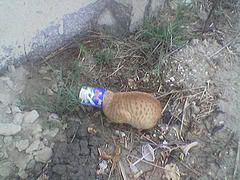
Anyway, I keep dreaming about the slightly warmer place we'll soon be heading to, Istanbul, and when I looked out of the window, I was really shocked to see that it was snowing. Again. I wasn't prepared at all - the last time we were in Istanbul it was the beginning of May, and everything was blooming then, and it was lovely and warm, and that's the image I had in my mind throughout the evening, until I saw the snow. Also, there's a huge construction site right outside our window - and what I noticed besides the snow were the Christmas lights all around the pit - kind of funny, considering how gruesome it all looks during the day.
The post-revolutionary politics depresses me: Yushchenko isn't excluding the possibility of the election getting cancelled, and there's nothing left to do but wait, ten more days and then some more. If they cancel the election and set a new one for March, I'll probably be voting against them all - to protest the shameless waste of money and other such bullshit. Enough is enough. But, hopefully, it'll all go smoothly.
The opposition is planning a pre-Christmas celebration on Sunday, with Christmas trees and a concert for kids at Maidan. It'll definitely make some people feel less tense about it all - which is good, I guess.
Here's another Istanbul picture, from May 2004:
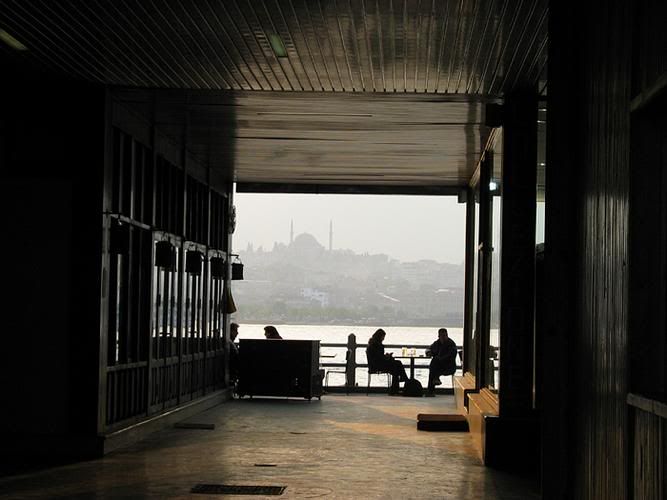
Thursday, December 16, 2004
LONDON - New tests reveal Ukrainian presidential candidate Viktor Yushchenko's blood contains the second-highest level of dioxin poisoning ever recorded in a human — more than 6,000 times the normal concentration, according to the expert analyzing the samples.
Abraham Brouwer, professor of environmental toxicology at the Free University in Amsterdam, where the blood samples were sent for analysis, said they contained about 100,000 units of dioxin per gram of blood fat.
However, the concentration could prove to be even higher, or lower, once results are in later this week from a more definitive test, said Arnold Schechter, a specialist in dioxin analysis from the University of Texas Southwestern Medical Center in Dallas.
[...]
Schechter said it also could determine that Yushchenko was poisoned with dioxin-like PCBs, rather than dioxins. PCBs were used in electrical transformers and as hydraulic fluid until they were banned in much of the world in the 1970s because they are so toxic and persist so long in the environment.
Brouwer's team has narrowed the search from more than 400 types of dioxin to about 29 and is confident they will identify the poison by week's end. That, in turn, could provide clues to its source.
"From a (chemical) fingerprint, at least you can deduce what kind of sources might have been involved," Brouwer told The Associated Press. "The labs will ... try to find out whether it matches any of the batches of dioxins that are around, so that maybe you can trace it back to where it was ordered or where it came from."
[...]
"It was very late before the rash started to develop, so if he had died it would have been a mystery illness of his pancreas, his liver or his gut and they would have said maybe it's some rare bug thing," said John Henry, a toxicologist at London's Imperial College. "He would have died within a few days and nobody would ever, ever have thought of dioxins."
[...]
It would not be difficult to deliver the dose Yushchenko received, experts say. If the dioxin he ingested is the most hazardous type, tetrachlorodibenzoparadioxin, or TCDD, it would take only a drop or two, or a tiny amount of powder mixed in food, to poison him.
Most of what is known about the health effects of acute dioxin poisoning comes from experiments on animals. Most animals would die from the levels in Yushchenko's blood.
But does that mean Yuschenko is the next Tom Paine? I'm not holding my breath. My old colleague at the eXile in Moscow, the writer/politician Eduard Limonov, put it best: The choice between two swine-looking bureaucrats is not so exciting. Ukrainians have not choosen [sic] between say, Che Guevara and Yanukovitch, between capitalist development and Revolutionary way of life... Coal miners better to drink their Ukrainian vodka "Goritka," [sic] stay home and fuck their huge wives.
It's gorilka, stupid.
Tosska (Evgeny Parfenov) has a totally awesome Odessa gallery on Flickr - on b&w thumbnails I at first saw St. Pete - and now that I know it's Odessa, one of my favorite cities, I'm even more excited about this find!
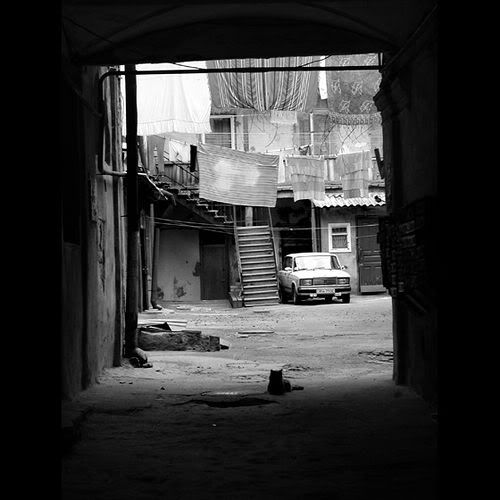
I'm not a morning person, not when I can afford it. It's 8:30 now and I've been up for about two hours, after maybe four hours of sleep. So yes, the cats are doing great. The small one has grown pretty large and is still growing; he's still without a name - can't find something that would really stick to him: Kot is our first choice, Mustafa is the second, but we're still thinking. Kosya Koskin sometimes enjoys and sometimes doesn't mind the younger one's company - the most important thing is that he is no longer a poor, betrayed, traumatized, blind older cat that he used to be at the beginning. They wake up (early) and start chasing each other (actually, for Kosya it's more like bumping into the younger one and then getting attacked). Today, they were too loud and I closed the door to my room, leaving them with less space to fight in, and at some point the younger cat decided to enter by any means, and all his scratching and kicking and meowing and pulling the carpet underneath the door, man, it sounded like there's some monster in the hallway, and it did wake me up, of course. I played with the younger one for a while, then played with Kosya and listened to him purr, and then it was no longer dark, so here I am now, feeling inappropriately insomniac at 8:40 in the morning...
I spoke with a boy from Zhytomyr region, he showed me a letter from his mother, with these words in it: "The whole village sent you there: don’t come back home without Yushchenko’s victory.”
Yet the most amazing thing was that every day, the director of the conservatory would come to us and ask to seize the conservatory building, because he had not been given any money for repairs in five years.
Wednesday, December 15, 2004
By way of consolation here's a partial translation of Yuri Rost's article on the 15th anniversary of Sakharov's death in this week's Novaya Gazeta. It's not much of a consolation, really.
Another Misha
***
[...]
Andrei Dmitrievich Sakharov walked out onto our playing field, full of bumps, holes, and fences as it was, with his own ideas about the nature and rules of the game. He wanted precision and fairness.
He lived according to his lot: without fear or pride. Having created the H bomb -- which he never regretted, believing nuclear parity to be a condition for peace at the time -- he gradually came to the conclusion that he was becoming an instrument for propping up a regime filled with agression and cruelty towards its own people. And having arrived at that realization, he proposed to his country to set aside its man-eating ideology and join the civilized world. But the country didn't take up his proposal.
Having lost his freedom, Sakharov continued to defend ours. He never thought of himself as a hero or a fighter. For him it was the natural lifestyle: to do what his conscience bid him and to say what his country was afraid to think about. The quiet voice couldn't reach the crowd of players merged with the spectators and umpires.
The game had gone on too long to remember the rules.
But Sakharov didn't think so. In his slightly short pants, with a slim file under his arm, he went against the circumstances we accepted, and the circumstances parted ranks and receded. And let him have his way.
The quiet words he spoke were unsettling to many. For all that went on, his presence made one uncomfortable about picking up the ball without scoring a goal and running with it to the middle of the field.
It made one uncomfortable about lying. And about putting one's principles on the market, where there were any principles.
Now it's only the recollection that brings discomfort.
[...]
With the loss of Sakharov we gained freedom of conscience. It is now free to visit and leave us as we please.
[...]
***
Zaigrannaya zhizn': "The rules were broken too many times to be heeded"?
After a moment of thought, that may be a bit closer to the original. Not very close, though.
Another Misha
The organizations are asking the court to strike down OFAC regulations that require publishers, writers, and translators to seek a license from the government to perform the routine services necessary to publish foreign literature in the United States.
Representatives of the plaintiffs' organizations expressed frustration over a series of OFAC rulings that have created an atmosphere of uncertainty and confusion among publishers fearful of incurring prison sentences of up to 10 years or fines of up to $1,000,000. Those rulings and the regulations they interpret mandate that Americans (1) may not publish work not already published in embargoed countries, (2) may not promote or market the work, and (3) may not provide vaguely defined "artistic or substantive alterations or enhancements" to the works.
[...]
A number of pending translations, among them the PEN Anthology of Contemporary Persian Literature and a bilingual book combining the writings and photographs of both Cuban and American writers, are at risk unless the current regulations change. Esther Allen, Chair of PEN's Translation Committee, said, "publishers are just not willing to expose themselves by printing works by America's 'enemies.' This is a sad contrast to the role they took in promoting voices from behind the Iron Curtain during the Cold War."
MoorishGirl has more on it.
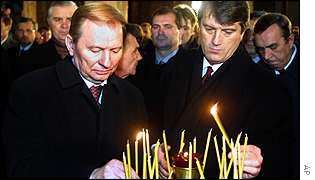
Here's more on what preceded the plant's shutdown, from the Organisation for Economic Co-operation and Development (OECD) Nuclear Energy Agency's website:
After the accident in reactor 4 and the fire in reactor 2, western countries attempted to persuade the Ukrainian authorities to definitively close reactor number 3. This was a priority for many countries in the bilateral exchanges and agreements with Ukraine. This western pressure crystallised when the Ukrainian parliament decided, in October 1993, to cancel a 1990s decision which recommended to immediate stop of all RBMK reactor construction, and the closure of the Chernobyl site. Later the European Union and the Ukraine concluded, on 20 December 1995, a memorandum of understanding for the closure of Chernobyl plant. In exchange for the definitive closure of all Chernobyl plants, the European Union (in the framework of TACIS programme) and western countries agreed to provide financial assistance to the Ukraine for the provision of electricity, and to solve social problems resulting from the closure of the site. Financial projects were estimated, in 1995, to be 2.3 billion dollars. A part of these funds has been committed to modifications of reactor number 3, creation of building for used fuel, and workshops for liquid and solid waste treatments.
Channel 5's anniversary piece today included footage from last month's debates, in which Yanukovych blamed Yushchenko for following orders from foreigners, who then failed to provide the funds they had promised.
The plant's current director was quoted in the same piece, saying that there was still a substantial risk of the Sarcophagus shelter's collapse, and this is why it was being "stabilized" now. The new shelter project would not be approved until mid-2005.
Nataliya Shumkova, director of the Department for Atomic Industry of the Ukrainian Ministry for Fuel and Energy, told Itar-Tass today that "Ukraine’s share in the Chernobyl Shelter Fund would stay at the level of six percent."
Early this year, Ukraine asked for U.S. support as concerns an increase in the payments to the fund. According to early calculations, the cost of the project has grown by 300 million dollars, to 1.059 billion dollars. So far, Ukraine’s share stands at 50 million dollars.
(Chernobyl.Info seems like a good resource on the plant's past and present.)
In a Dec. 8 entry, he even mentions Yushchenko's poisoning and posts those ubiquitous "before and after" photos...
This past summer, we were at his concert in St. Pete - a mind-blowing experience, especially for Mishah.
Here's part of David Byrne's July 17 entry:
The sound is less than perfect but the audience is incredible. For the 1st time there is a big reaction to "Aucensia" – I guess the Kusturica movie was a hit here. At one point I notice people in the audience doing some weird hand shaking dance, so I do it too.
With the lack of air circulation and the cigarette smoke it rapidly becomes hard to breathe on stage. I'm drenched in sweat- head to toe- and have to catch my breath fairly often, as do the others. But that only seems to add to the excitement.
And this:
Malu on Russian fashion: "Dad, do the people here think they look good?"
The Daily Telegraph
End Column
(Filed: 10/12/2004)
Be Watchful
Am I the only person (asks "ETHNOLEPT") to have been disgusted by the newspaper photographs of crowds demonstrating in the Ukrainian city of Kiev?
Although their numbers ran into thousands, even millions, my own minute examination of these photographs failed to reveal any but white people. This would be unthinkable, and quite rightly, in Britain, where any photograph of a group of people, however small, in any major city, village, or average home, would show a good proportion of black people or Indians.
Friends tell me that there are very few black people or Indians in the Ukraine, so it is not surprising that crowds of demonstrators are entirely white. This is beside the point.
If the inhabitants of the Ukraine are predominantly white, that is their misfortune. But, as in Britain, such photographs should point the way to a better future, in which the Ukraine will be as multiracial as any other country, and most of its present troubles, which are due to persistent racism, will be over.
Tuesday, December 14, 2004
In Beslan.
Her latest story in Novaya Gazeta is about several mothers whose children are either dead or missing, and how they blame it on the teachers who managed to survive, and how unfair that is, because the ones to blame are the terrorists, and the local authorities, and the local police, and the investigators who aren't done interrogating the witnesses yet, and, of course, Putin is to blame, too - many people, but not the teachers who were taken hostage together with the children and could have died just as well.
It hurts to read about it - not just this piece by Politkovskaya, but about Beslan in general, and this is probably the first time I've read something in the past couple of months. I have to run now but I'll translate part of this piece in the evening.
I've no idea how the story of Politkovskaya's poisoning ended. It was hard to care too much about it then, and when it was all over, it was hard to remind oneself of it all again. Maybe I'll look through Novaya Gazeta's archives tonight, and if I find something, I'll post it here.
Yushchenko poisoned with dioxin! Election rigged - sounds more like a novel than real life...
This got me thinking: am I surprised about the rigged election? No. Am I surprised about the poisoning? No. I am shocked but not surprised - every time I see Yushchenko's gray face on TV, it's breaking my heart, but I know we have to be grateful that he's alive. Now that we know it was dioxin, I don't want to hear any more about it - it hurts too much to know. When the poisoning was still not official, there was a "bad sushi" explanation - but who believed it?
Basically, what I'm trying to say here is that the evil campaign and the rigged election were something most of us had been expecting.
The real surprise were the people - so many of them, so well-organized, non-violent, decisive. Also, the Supreme Court's decision was a huge surprise - that the judges have managed to withstand the pressure. What also seems like the stuff of fiction is that, despite all the violations, Yanukovych has been given another chance and may still become president. He won't - but it's weird to know that such a possibility still exists.
Somehow, it all reminds me of Salman Rushdie's 1983 novel, Shame - the novel about Pakistan:
The country in this story is not Pakistan, or not quite. There are two countries, real and fictional, occupying the same space, or almost the same space. My story, my fictional country exist, like myself, at a slight angle to reality. I have found this off-centring to be necessary; but its value is, of course, open to debate. My view is that I am not writing only about Pakistan.
My view is that the book is also a little bit about Ukraine - or that Pakistan is like Ukraine in many ways. This little passage helps me understand how someone can look at what's going on here as if it's a novel: I've never been good at abstract thinking myself, but if I can read about Pakistan and pretend it's fiction, why can't the same principle apply to Ukraine?
So here's some more about the 1970 general elections in Pakistan - West Pakistan and what used to be East Pakistan and is now Bangladesh - or not quite, from Salman Rushdie:
The elections which brought Iskander Harappa to power were not (it must be said) as straightforward as I have made them sound. As how could they be, in that country divided into two Wings a thousand miles apart, that fantastic bird of a place, two Wings without a body, sundered by the land-mass of its greatest foe, joined by nothing but God ... she remembers that first day, the thunderous crowds around the polling stations. O confusion of people who have lived too long under military rule, who have forgotten the simplest things about democracy! Large numbers of men and women were swept away by the oceans of bewilderment, unable to locate ballot-boxes or even ballots, and failed to cast their votes. Others, stronger swimmers in those seas, succeeded in expressing their preferences twelve or thirteen times. Popular Front workers, distressed by the general lack of electoral decorum, made heroic attempts to save the day. Those few urban constituencies making returns incompatible with the West-Wing-wide polling pattern were visited at night by groups of enthusiastic party members, who helped the returning officers to make a recount. Matters were much clarified in this way. Outside the errant polling stations large numbers of democrats assembled, many holding burning brands above their heads in the hope of shedding new light on the count. Dawn light flamed in the streets, while the crowds chanted loudly, rhythmically, spurring on the returning officers in their labours. And by morning the people's will had been expressed, and Chairman Isky had won a huge and absolute majority of the West Wing's seats in the new National Assembly. Rough justice, Arjumand remembers, but justice all the same.
The real trouble, however, started over in the East Wing, that festering swamp. Populated by whom? - O, savages, breeding endlessly, jungle-bunnies good for nothing but growing jute and rice, knifing each other, cultivating traitors in their paddies. Perfidy of the East: proved by the Popular Front's failure to win a single seat there, while the riff-raff of the People's League, a regional party of bourgeois malcontents led by the well-known incompetent Sheikh Bismillah, gained so overwhelming a victory that they ended up with more Assembly seats than Harappa had won in the West. Give people democracy and look what they do with it. The West in a state of shock, the sound of one Wing flapping, beset by the appalling notion of surrendering the government to a party of swamp aborigens, little dark men with their unpronounceable language of distorted vowels and slurred consonants; perhaps not foreigners exactly, but aliens without a doubt. President Shaggy Dog, sorrowing, dispatched an enormous Army to restore a sense of proportion in the East.
Iskander Harappa is, of course, Zulfikar Ali Bhutto; Arjumand is his daughter, Benazir. Or not quite: it's a novel, not real life, sort of. Fiction, not history.
In any case, though, if Pakistan could provide Salman Rushdie with so much material, Ukraine's got some potential, too.
Monday, December 13, 2004
It looks like Basecsu will be the winner - and even though I wasn't really following, I'm glad: not because of all the similarities, but mainly because the Romanians I met at the beginning of our protests said Kyiv today reminded them of 1989 in Romania - only it ended with too much blood 15 years ago.
I hope it stays peaceful this time.
P.S. Yes, Basescu is the winner!
Victor Agababov, 22, earns the princely sum of $650 a month working as a computer programmer in Yerevan, making him the best paid member of his university class. Yet he tends to mock his own achievement because his job involves doing outsourced work transferred from the United States and Japan.
"We are a cheap work force," he said. "We're cheaper than Indians and probably 10 times cheaper than Americans."
Mr. Agababov is considering moving to Moscow to find a technology job that might promise advancement and independence.
This should sound all too familiar to many, many Ukrainians, unfortunately.
Right now, however, we may be heading for a breakthrough that most Armenians can only dream about:
Fluent in English and Russian as well as their native Armenian, they were impatient with the growing pains of a post-Soviet state and cynical about politics.
To Gevorg Karapetian, a doctoral student in computer engineering, the ideal leader would be a businessman, "someone educated and clever enough to make relationships with the neighboring countries."
The present crowd of politicians did not measure up. "Our president and all the presidents before him just want to be president," Mr. Karapetian said.
It's scary to be too hopeful now, especially when Yushchenko's victory is still at least two weeks away, but who knows, maybe he'll turn out to be the president capable of leading this country towards prosperity. He's managed to wake us up politically, and that's an awesome beginning.
As for Armenia, I do know one man who may turn into the next Yushchenko/Saakashvili type of leader - but he's living and working elsewhere for now, and it's completely up to him whether to accept such a huge challenge or not. I hope he will, eventually.
Sunday, December 12, 2004
"What about the news that Russia 's Interpol is looking for you?" the Los Angles Times reporter asked her. "Oh that's pure black PR. Come spring it will all melt away like the snow. Really it's funny... if Interpol were really searching for me, then I would be going to press conferences in a big black coat and thick fake beard, and all of you would have had to come visit me blindfolded."
***
I was meeting with my Odesa friend today - she spoke of how easy it may be to ignite "the masses" and ruin everything. Tiraspol, the capital of Transnistria is some 70 km from Odesa, and she remembers how her Transnistrian classmates quit university back in the early 1990s and went off to fight for what they thought was their freedom from Moldovans - who knows where they are now. (Transnistria used to be the richest part of Moldova; now it's all gone and the rich ones are those who trade arms illegally.) Then there's Abkhazia - my friend used to go there regularly as a child; instead of making money from tourism all these years, they destroyed all they could and are yet to begin the recovery process. And there is also Chechnya, where no one could have predicted in 1994 what it would look like a decade later. Russia, of course, is very invloved in these three regions. Hopefully, they'll stay away from Donetsk and Luhansk.
Saturday, December 11, 2004
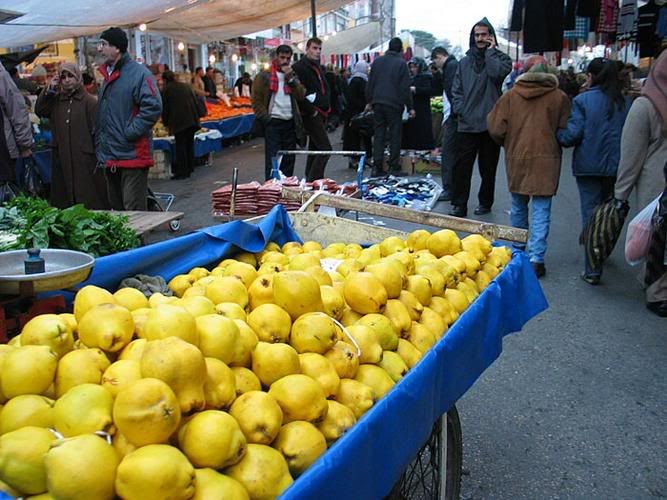
Friday, December 10, 2004
- A View from Grozny: journalists Mikhail Lukin, Musa Muradov and Dmitry Kamyshev talk about how ordinary and un-warlike everything appeared at the very beginning of the first Chechen War
- Interview with General Gennadiy Troshev about the army's inadequate preparedness to the war that lasted "613 days, killed over 5,000 Russian soldiers and as of yet unknown number of civilians"
- Interview with Hasan Baiev, a Chechen surgeon who lives in the States now but spent both wars working in Chechnya
I, unfortunately, am too sleepy now to translate even one shortest bit of it... I'm sorry. Maybe tomorrow.
***
Another Ekho Moskvy interview, also in Russian - with Taras Chornovil.
I'm posting this link here not because I think this interview is worth reading - no, it is not - but because I want to have it on hand in case this little schmuck attempts to switch sides again after Yanukovych loses the election.
I've realized that it hurts to even say his last name out loud, Chornovil, because it has always been the name of an admirable, courageous, brilliant person, his father, Vyacheslav Chornovil, and not of a coward, an imbecile who, judging by this interview, resembles his current boss a lot in that they both can neither think clearly, nor express their little retarded thoughts coherently.
This guy has been the greatest shock and disappointment of this election. Andriy Shevchenko, our/Milan's football star, follows closely behind.
In Canada there is an agency called Canadem that organizes international election observer missions for Canada among other things. They are now accepting applications for the mission to Ukraine this month. The response has been so overwhelming that they had problems with their email server - mail boxes kept filling up so they had to keep creating new email addresses to accept all the messages. Two days ago they announced that there were 600 applications, then 1000 by the end of the day, and finally 1500 applications as of yesterday. By now there is probably many more. They have posted the following message:
Response from the Canadian public to this mission has been wonderful; over 1500 Canadians have offered their volunteer assistance! Given this high level of interest, new applicants must demonstrate that they have either Ukrainian or elections experience.
The government of Canada is expected to send 500 observers. The link is: http://canadem.ca/elections/ukraine/
The Ukrainian Canadian Congress is also organizing volunteers – see: http://ucc.ca/election_observer_project/
